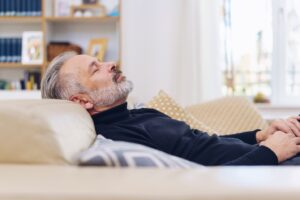
If you have sleep apnea, you may often feel fatigued during the day. The temptation to rest your eyes for a few minutes can be strong. However, you need to approach the idea of napping with caution. While naps can sometimes help restore your energy, they might not always be beneficial. Continue reading this blog post to explore the factors you need to consider and discover practical tips for making informed decisions about daytime naps.
Potential Downsides of Napping with Sleep Apnea
Before you decide to nap, you should be aware of several important drawbacks:
- Disruption of Sleep Schedule: Taking naps during the day can make it more difficult to fall asleep at night. Your regular sleep-wake cycle may suffer, leading to even more fragmented rest.
- Lack of Access to Treatment Devices: If you use a CPAP machine or an oral appliance at night, you may not have these available for naps, especially if you are away from home. Napping without your prescribed device can result in the same interrupted breathing and oxygen deprivation that occur at night.
- Risk of Nap Dependency: Using naps to compensate for poor-quality nighttime sleep can create a cycle of reliance. This habit might prevent you from getting into a good routine of rest and may make it more difficult for you to address the underlying issue that is affecting your sleep.
How to Nap Safely with Sleep Apnea
If you decide that a nap is necessary, you can take several steps to minimize potential risks and maximize the benefits:
- Use Your Treatment Device: Always have access to your CPAP machine or oral appliance when you nap. This step ensures that your breathing remains steady and uninterrupted, even during short periods of rest. (Since oral appliances are more portable than CPAP machines, they are a great option for people who nap away from home.)
- Keep Naps Short: Limit your nap to 20 or 30 minutes. Brief naps help you avoid entering deep sleep, which can lead to grogginess and further disrupt your sleep cycle.
- Nap Early in the Day: Choose an early afternoon nap if possible. Late naps can interfere with your ability to fall asleep at night and may disturb your circadian rhythm.
- Prioritize a Nighttime Routine: Develop consistent bedtime habits to improve your overall sleep quality. The better your nighttime rest, the less likely it is that you will feel the need for daytime naps.
Focus on Nighttime Sleep Quality
Naps can offer a temporary boost in alertness, but they should not replace efforts to improve your nighttime sleep. Be sure to properly address your sleep disorder so you can get the most out of your daily routine of rest.
Meet the Practice
Dr. Ivan Paskalev is a highly skilled dentist in Eugene, OR, who proudly offers oral appliance therapy for individuals with obstructive sleep apnea. If you often feel exhausted during the day, this treatment might be the solution! To learn more about how Dr. Paskalev and our team may be able to serve you, contact College Hill Dental at 541-485-0272.
